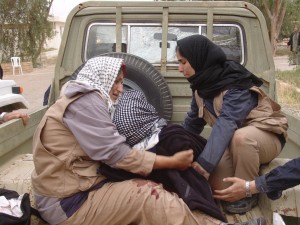AGENCE FRANCE PRESSE
BAGHDAD — Last week’s deadly Iraqi raid on an Iranian opposition base inside its territory signals the growing influence of neighbouring Iran, as US forces prepare to withdraw at the end of this year.
“Baghdad has no interest in taking a hostile attitude toward Iran, which is its most important neighbour, the major power in the region and the country with the greatest means to intervene in Iraqi affairs,” said Hameed Fadhel, professor of political science at Baghdad University.

On April 8, Iraqi forces clashed with members of the People’s Mujahedeen of Iran (PMOI) at Camp Ashraf, the rebels’ base 80 kilometres (50 miles) north of Baghdad, which was set up in the 1980s and houses around 3,500 dissidents.
A UN spokesman said in New York on Thursday that 34 Iranian rebels died in the clashes, a day after UN observers visited Camp Ashraf, which Baghdad has demanded be closed by the end of the year.
The victims included women and most were shot, according to UN human rights spokesman Rupert Colville in Geneva. He added that dozens more were wounded.
UN human rights chief Navi Pillay on Friday called for an independent inquiry.
“The Iraqi military were well aware of the risks attached to launching an operation like this in Ashraf,” she said.
“There is no possible excuse for this number of casualties. There must be a full, independent and transparent inquiry, and any person found responsible for use of excessive force should be prosecuted.”
The PMOI said that 300 people were wounded in the assault, and that there had been more attacks since.
Just after the raid, the Iraqi military said it had been in a confrontation with stone-throwing Ashraf residents in which three people were killed.
Government spokesman Ali Dabbagh denied the military had killed people and said the authorities would hold their own investigation.
“Our security forces believe that the dead were killed by their own guards because they were trying to escape,” Dabbagh told AFP. “They had already committed similar acts in the past.”
The day after the raid, Iranian Foreign Minister Ali Akbar Salehi praised Baghdad.
“Iraqis must not allow activities of such groups and not shelter such terrorist groups. We appreciate the move by the Iraqi government,” Salehi said.
The raid came a day after US Defence Secretary Robert Gates arrived in Baghdad and accused Tehran of instigating regional unrest.
Asked on Wednesday whether the raid was related to Gates’ criticism of Iran, a senior US military official told reporters in Baghdad: “I think it was a significant coincidence.
“Clearly they (Iranians) will continue to work things so that they get more influence…(but) the more they push the more reaction they will see from the Iraqi people” who oppose Iranian interference, he added.
Camp Ashraf was disarmed following the US-led invasion of Iraq in 2003 and has become a mounting problem for the Iraqi authorities since American forces handed over security for the camp last year.
The PMOI is on the US government terrorist list, but US Senate foreign affairs committee chairman John Kerry on Thursday called the Iraqi military action “simply unacceptable.”
While Gates insisted that Iraqi leaders should consider asking some of the nearly 50,000 remaining US forces in Iraq to stay on after their planned withdrawal at the end of 2011, US military officials say they received no such request from Prime Minister Nuri al-Maliki.
The PMOI directly accuses Maliki of kowtowing to Iran and ordering the raid.
“The United States placed pressure on Iraq to let the mujahedeen remain in Iraq, but Baghdad understands that with the upcoming departure of US forces that pressure will vanish,” Fadhel maintained.
The Shiite Maliki remains indebted to Iran for his staying on as premier, after he came second to the secular Iyad Allawi in the March 2010 elections.
During the eight months of deadlock that followed the polls, Iran put pressure on Shiite groups under its influence to get behind Maliki, who finally formed a unity government in December.
United in their opposition to ousted dictator Saddam Hussein, and sharing their Shiite faith with Tehran, Maliki, many ministers in his cabinet and a large number of Iraqi lawmakers spent time as exiles in Iran.
Saddam established Camp Ashraf in the 1980s to act as a base against Iran when the two neighbours were at war.
The left-wing PMOI was founded in 1965 to oppose the shah of Iran, but after the 1979 Islamic revolution it took up arms against the clerical regime.